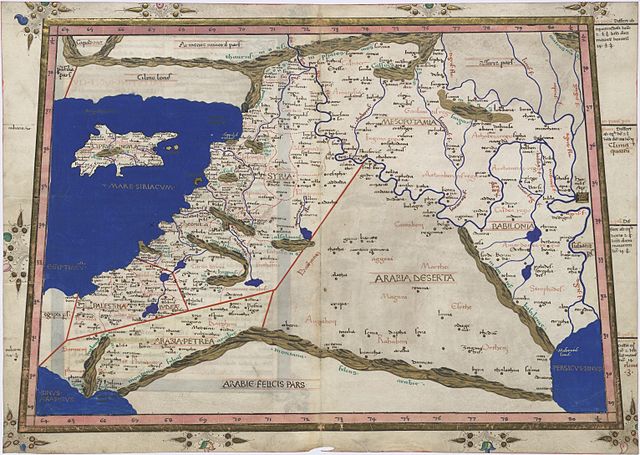Wars of the Diadochi > Syrian Wars > Second Syrian War
Second Syrian War

Background
Second Syrian War
Part of the Syrian Wars
Part of the Wars of the Diadochi

Ptolemy Tabula Asiae IV - Nicolaus Germanus (1467)
Began: 260 BC
Ended: 253 BC
Battles
Previous: First Syrian War
Next: Third Syrian War
The Second Syrian War (260–253 BCE) occurred between the Ptolemaic Kingdom and the Seleucid Empire over the territory of Coele-Syria which contained vital trade and transportation routes between Greece, the Mediterranean Sea, Egypt and the rest of Asia. The war began in 261 BCE when Antiochus II Theos succeeded his father. He arranged an alliance with the Antigonad king that currently ruled over Macedon named Antigonus II Gonatas who was also interested in seeing Ptolemy II Philadelphus pushed out of the Aegean Sea.
The Second Syrian War occurred ten years after the First Syrian War which saw a Ptolemaic victory over the Seleucid Empire. Following this the Ptolemaic Kingdom would advance its borders all the way into Anatolia and come very close to Greece itself such as Cilicia. In order to assist him against Ptolemy the Macedonians enlisted the help of the Seleucids and soon forged an alliance with them. With the military backing of the Macedonians soon Antiochus II launched an invasion of the border settlements that the Ptolemies had in Asia. Not much about the actual battles and engagements of the Second Syrian War is available.
Battle of Cos
See Battle of Cos
Only a fraction of the total amount of Greek literature survives to the present day, much of it being destroyed at the Library of Alexandria over the centuries. However, the documents and accounts we do have make it clear that the Ptolemaic Navy was soundly defeated at the Battle of Cos in 261 BCE. The aftermath of the conflict left Ptolemaic naval power in the Mediterranean severely crippled.
In addition to losing the naval battles the Ptolemaic Army soon lost Ionia, Cilica and Pamphylia while Antiochus was able to capture the cities of Miletus and Ephesus. Eventually northern conflicts and the rebellion of Corinth and Chalcis, possibly instigated by Ptolemy in 253 BCE forced the Macedonians to retreat from the fighting to maintain their own borders.
Conclusion
The Second Syrian War ended in 253 BCE when Antiochus would marry Berenice Syra who was the daughter of Ptolemy II Philadelphus. In order to do this Antiochus had to repudiated his previous wife Laodice and gave her substantial land and wealth in exchange. He would later die in Ephesus in 246 BCE by poisoning, with some sources suspecting it was poison by Laodice but this remains unconfirmed. Ptolemy II would die the same year in 246 BCE and this would set the framework for the Second Syrian War.
Syrian Wars
Warfare Links
- Agrianians
- Alexanders Military Structure
- Alexanders Military Tactics
- Alexanders Military Units
- Alexanders Military
- Antigonid Army
- Antigonid Military
- Antigonid Navy
- Argyraspides
- Baggage Train
- Bematist
- Companion Cavalry
- Greco Bactrian Military
- Hellenistic Armies
- Hellenistic Armor
- Hellenistic Battles
- Hellenistic Cavalary
- Hellenistic Chariots
- Hellenistic Diplomacy
- Hellenistic Fortifications
- Hellenistic Infantry
- Hellenistic Militaries
- Hellenistic Military Architecture
- Hellenistic Military Engineers
- Hellenistic Naval Battles
- Hellenistic Naval Warfare
- Hellenistic Navies
- Hellenistic Shields
- Hellenistic Siege Engines
- Hellenistic Siege Warfare
- Hellenistic Siege Weapons
- Hellenistic Spears
- Hellenistic Treaties
- Hellenistic Warships
- Hellenistic Weapons
- Hellensitic Helmets
- Hetairoi
- Hypaspists
- Hyrcanian Cavalry
- Macedonian Army
- Macedonian Phalanx
- Machimoi
- Metalleutes
- Paphlagonian Horsemen
- Persian Immortals
- Pezhetairos
- Phrourarchs
- Prodromoi
- Ptolemaic Army
- Ptolemaic Military
- Ptolemaic Navy
- Saka Mounted Archers
- Sarissa
- Sarissophoroi
- Seleucid Army
- Seleucid Battles
- Somatophylakes
- Sphendonetai
- Strategos
- Toxotai
- War Elephants